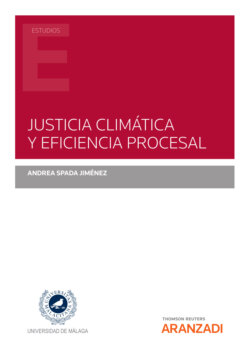Читать книгу Justicia climática y eficiencia procesal - Andrea Spada Jiménez - Страница 6
На сайте Литреса книга снята с продажи.
Introduction
ОглавлениеThe phenomenon of the global climate change and its effects has become really notorious on this side of the planet. For the last decades, our society has witnessed the continuous politic and scientific fight against it. We can witness technological and scientific improvements that enables us to determine causes and effects of the different activities that affect our environment, and also to offer alternatives actions that lead us to respect our environment. As well as being witnesses of the agreements and conferences that are celebrated internationally and regionally oriented to stop the effects of this climate global change.
However, all these efforts are not notorious and can hardly be seen. As time goes by, the global climate change has not deceased, but, increased. Scientists predict terrible consequences for the future of the human nature. That is why, we raise our interest to study the following subject on behalf, as environment safeguard policies seem not to be efficient enough, according the previous considered consequence and alert.
For this reason, we asked ourselves whether is would be possible for the procedural law could find a way to embrace this issue, and we found out, effectively according to our point of view, that this branch of the law could be part of the solution to the problem. In order to reach to this conclusion, we have been forced to carry out a wide investigation to identify the cause of the climate global change and the international legislative policies.
We have reached to the conclusion, that the effects of the global climate would be the consequence of the uncontrolled industrial development carried out international companies altogether with the different government, and crime commission against the environment. However, in both cases the origin of both activities should be considered transnational, whether we consider a fellow that is involved or the effects implied, that is how it should be faced. Nevertheless, as there is no criminal guardianship existing regarding the coded or harmonized for the environment not even regionally, the pollution of the environment that justifies the economic development is accepted by the governments. It is considered an external effect of the productive activity and therefore could not be avoided.
As a result of the lack of criminal policy system that protects the environment, we suggest the various doctrine law proposes that exist nowadays and that guide to a conventional regulation, where eco- crimes regarding environment felony that are registered in national legislation, as the illegal fishing, illegal flora and fauna trading, and ecocide. This last one, considered as an international crime that produces wide and serious injury to de ecosystem in the long run.
Likewise, we have developed an investigation regarding the existing criminal responsibility system related to the environmental issues. The previous mentioned system, based on the base on the International general structures of the environment, is focused on the units that committed illicit crime against the environment. Taking into consideration the international precautionary, incentive and criminal policy and the penal responsibility system regarding theses issues have demonstrated that the soft law prevail over the hard law, which leads to non- effective results and evidencing the need to create legal binding instruments to face the climate change.
This mentioned situation is our main aim to embrace the focus of this essay on the climate change issue directly. Firstly, taking into account that the place affection on the environment is a global problem, that does not only affect the environment stricto sensu, but it rebounds in human rights of the human race. Second, it is not justified the non existence of international crime responsibility system regarding such an important international issue. Third, we have to have in mind that the adequate protection of the human rights has to be guaranteed through the penal jurisdictional system, according to the dissuasive and preventive effect.
Considering the above mentioned, it can be determined that there is an abscence of climate justice and that there is a need for the approval of procedural law on its international dimension.
The word climate justice is used by social movements when they claim for the creation of effective mechanisms that could allow the effective accomplishment of the international regulation for the protection of the environment and the climate change, as well as to create an adequate jurisdiction that could allow a sustainable development.
The different mechanisms of environmental redress, regardless substantive or pleading law, posed by these movements, are focused on international code or broad the ratione materiae competence of the CPI to ecocide.
Every proposal has been investigated and taken into account in the present essay, considering de possibility that they may be applied in the future.
On our behalf, we take into account the absence of the governments to develop effective systems, the fellows that commit the mentioned crimes and the urgent need for a quick action against the climate change. We present the tracks that we understand should be used with the actual jurisdictional systems through which we could get an effective guardianship with crime trait. One of them would be the access to the International Crime Court, as it is the only international jurisdictional system; other one would be through the application of the universal jurisdiction as the only pleading mechanism that enables the live exercise of the extraterritorial jurisdiction. We are especially referring, quoting the last one specially, to pose an amend to our inner judicial system, that should imply the environmental crime.
